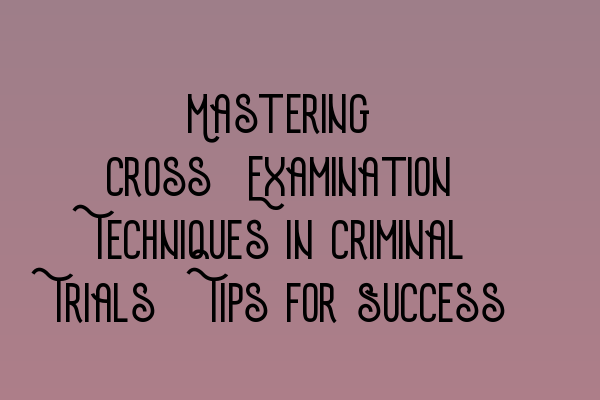Mastering Cross-Examination Techniques in Criminal Trials: Tips for Success
When it comes to criminal trials, cross-examination is a critical phase where the defense aims to challenge the credibility and accuracy of the prosecution’s witnesses. This strategic process can make or break a case, as it allows the defense to present alternate narratives and cast doubt on the prosecution’s version of events. As a solicitor, mastering cross-examination techniques is essential to effectively advocate for your clients.
Preparing for Cross-Examination
Preparation is key to success in cross-examination. Before stepping into the courtroom, thoroughly review the case facts and witness statements. Identify key areas where inconsistencies or contradictions may exist, and craft questions that will elicit the desired responses. This will allow you to control the narrative and cast doubt on the prosecution’s case.
Related Article: Updates in UK Criminal Laws: Staying Informed and Prepared
Establishing Control and Building Rapport
During cross-examination, it’s essential to establish control and build rapport with the witness. Begin by asking simple, non-threatening questions to put the witness at ease and gain their trust. This will encourage them to provide more candid responses. By creating a comfortable and respectful environment, you increase your chances of uncovering inconsistencies and biases.
Utilizing Leading Questions
Leading questions are instrumental in cross-examination. By phrasing questions in a way that suggests the desired answer, you can ensure greater control over the witness’s responses. For example, instead of asking, “What happened next?” it’s more effective to ask, “Isn’t it true that you immediately left the scene after the incident?” This technique allows you to guide the witness and highlight the inconsistencies in their testimony.
Related Article: Decoding Criminal Evidence Rules: A Detailed Analysis
Exposing Biases and Motives
Cross-examination is an opportunity to explore any potential biases or ulterior motives of the witness. By carefully analyzing their background, relationships, and previous statements, you can uncover any hidden agendas that may undermine their credibility. Highlighting these biases to the jury can significantly weaken the prosecution’s case and bolster your defense.
Managing Objections and Rebutting Testimony
During cross-examination, expect objections from the prosecution. Anticipate objections based on relevance, leading questions, or hearsay, and be prepared to counter those objections confidently. Maintain control by staying composed and ensuring your questions are within the bounds of admissible evidence. Effectively rebutting the prosecution’s witnesses can have a powerful impact on the jury’s perception of the case.
Related Article: Ensuring Rights of Victims in Criminal Procedures: Legal Protections and Support
Using Visual Aids
In complex cases, visual aids can be valuable tools during cross-examination. Maps, diagrams, photographs, or even timelines can help illustrate the sequence of events or demonstrate inconsistencies in the witness’s testimony. Utilizing visual aids effectively can enhance the jury’s understanding and reinforce your case.
Staying Adaptable and Aware
Flexibility is crucial during cross-examination. Adapt your strategy based on the witness’s responses and the overall dynamics of the courtroom. Pay close attention to the jury’s reactions, as their responses can provide valuable insights into the effectiveness of your cross-examination. Stay nimble and adjust your approach as needed to maximize the impact.
Continual Learning and Improvement
Mastering cross-examination techniques is an ongoing process. Stay updated with the latest developments and best practices in criminal law by attending workshops and seminars on criminal practice. These events provide invaluable opportunities to enhance your expertise and learn from experienced practitioners.
Related Article: Workshops and Seminars on Criminal Practice: Expanding Your Expertise
By continuously improving your cross-examination skills, you can effectively represent your clients and achieve successful outcomes in criminal trials. With careful preparation, strategic questioning, and a deep understanding of the intricacies of the case, you will be well on your way to mastering this crucial phase of courtroom advocacy.
For further insights and resources on SQE criminal law study groups, browse our article on Enhancing Your SQE Criminal Law Study Group Experience.
